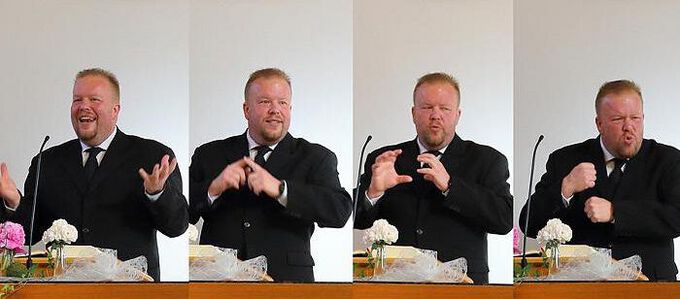
Although not numerous, the deaf in the New Apostolic Church are a group that are heard. The Regional Churches have different approaches in how to integrate them. Here is a bit of an overview to mark the International Day of Sign Languages, which is observed annually on 23 September.
At least 15 million deaf signers use Indo-Pakistani Sign Language (IPSL), the predominant sign language in South Asia. This ranks IPSL as the 151st most “spoken” language in the world. In total, there are over 300 different sign languages used around the world.
For a long time, it was thought that a sign language was not a language in its own right. However, a sign language has all the linguistic properties of a fully-fledged language and has therefore been accepted as a minority language in many countries. At the very least, in many countries, the deaf and those who use sign language are entitled to Sign Language interpreters when dealing with federal authorities. In 1981 already, sign language was enshrined as a minority language in Sweden. Uganda took this step in 2000 and Switzerland and Austria in 2005. In New Zealand, sign language has been one of the official languages alongside English and Māori since 2006. British Sign Language was recognised as a language in its own right by the UK government in 2003.
Deaf members in the New Apostolic Church
The first divine service for deaf members of the New Apostolic Church was conducted by Evangelist Günther Lierse. He himself had grown up with deaf parents and was very committed and did a great deal for his deaf brothers and sisters of faith. On 12 May 1963 he conducted the first divine service for deaf and hard of hearing members in our church Dortmund-North in Germany. Since then the offer has been expanded. Since 2016, Bischoff Publishers has been offering transmission services in German Sign Language for the German Regional Churches. The publishing house provides the studio and technology and coordinates the interpreters.
Other Regional Churches coordinate their services themselves. In the Regional Church Congo South-East, a divine service with sign language interpretation is sometimes broadcast on television, and District Apostle Tshitshi Tshisekedi conducted a service for the deaf and hard of hearing in his district in 2014. In the southern parts of Europe family members take on the tasks of interpreting for their deaf family members.
Signing while preaching
The Regional Church Southern Germany also interprets divine services for its twenty deaf members into German Sign Language. Once a month, the brothers and sisters meet live for this purpose, and since the pandemic, a service with interpretation into German Sign Language has been streamed every Sunday.
The New Apostolic Church Western Germany relies on signed German, in which every word of a spoken sentence is signed. The speaker himself signs as he speaks. Since the speaker automatically speaks more slowly as a result, this has the advantage that even people who are hard of hearing and have not mastered sign language can follow the sermon.
Everyone is entitled to pastoral care
“All members of the New Apostolic Church are entitled to individual pastoral care,” it says on the official website of the New Apostolic Church, nak.org. For people who are deaf or hard of hearing this can sometimes be difficult. If there is no minister in the congregation who is proficient in sign language, or no family member is available to interpret, the brother or sister is left to deal with the problem alone. Fortunately, the Churches in Germany have come up with a solution.
In Western Germany, for example, there is a congregation for the deaf and hard of hearing, of which Shepherd Bernd Graffenberger is the rector. In addition to his regular duties as a rector, he also coordinates regular live services for the deaf members and pastoral care visits with ministers who can communicate in sign language, or he organises interpreters.
One of these interpreters in the New Apostolic Church Western Germany is Felix Frobel, a Priest, who also comes to Bischoff Publishers to interpret transmission services into German Sign Language. He discovered this language through a childhood friend, and it fascinated him. Later, he made it his profession. He offers basic courses for ministers who want to learn sign language in order to be able to communicate with their deaf members and provide pastoral care. “The connection to the local congregation is very important to us,” says Felix Frobel. “We would like interpretations to be offered in the local congregations.”
No empty phrases
In sign language, matters of faith are expressed very differently. You cannot just use the typical New Apostolic phrases such as “suffering is experienced and lived through”. “First of all I look to see which Bible text is being used and sometimes I have to opt for a different Bible translation. Some Bible texts are very complex, so I try to simplify things and create and use images,” explains Priest Frobel. And it is not just the deaf who think this is great. “After such a service, we often get feedback from hearing brothers and sisters, saying that they understood a lot. The officiant spoke slowly, the language was simple, and there was no duplication.” The things Felix Frobel has learned stand him in good stead when he has to prepare for a normal divine service.
Photo: M.B. – NAK Velbert




